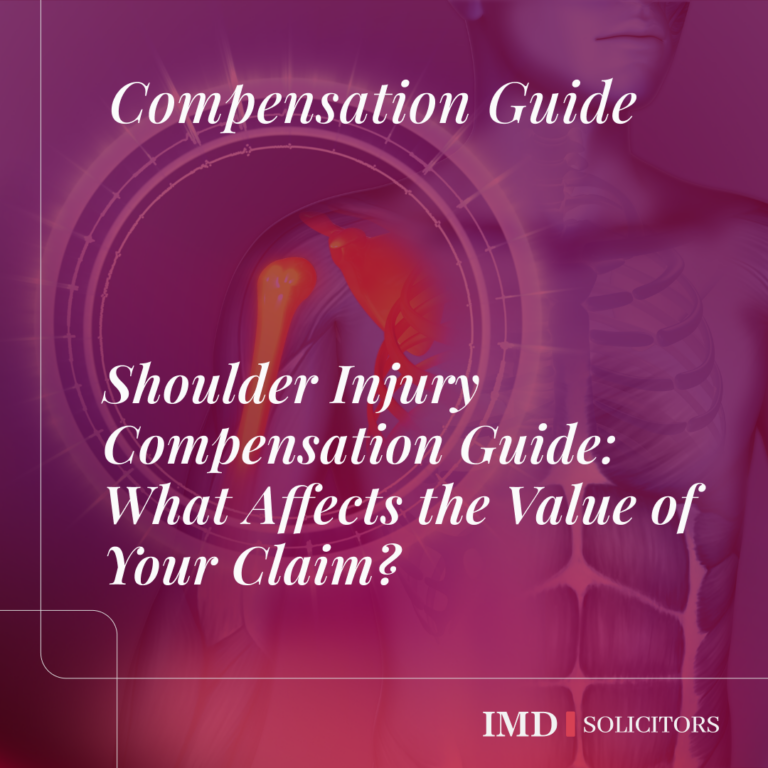Speak to a member of our specialist international team of UK personal injury lawyers today on 0330 107 0107.
Shoulder injuries, often seen in personal injury law, represent a diverse range of complications, from mild to severe, with varying degrees of long-term impact on a victim’s daily life. These injuries can be caused by a wide range of accidents, including falls, road traffic collisions, or other traumatic events. The legal value placed on such injuries varies significantly based on their severity, the extent of permanent damage, and the level of discomfort experienced by the victim. In this guide you will find a detailed discussion of shoulder injuries, provides insight into the process of assessing damages, highlighting the nuances involved in valuing these injuries for compensation purposes.
Types of Shoulder Injuries
Shoulder injuries often present a complex combination of pain, limited movement, and long-term disability. These injuries can be broadly categorised into soft tissue injuries, dislocations, fractures, and more serious nerve damage. The legal assessment of these injuries depends heavily on medical evidence and the impact on the victim’s lifestyle.
1. Severe Shoulder Injuries with Nerve Damage
Among the most serious types of shoulder injuries are those involving the brachial plexus – the network of nerves responsible for movement and sensation in the arm. Damage to this area can cause significant disability, including restricted movement, constant pain, and reduced ability to perform basic tasks.
The compensation for these types of injuries can range from £24,000 to £60,000, depending on the severity and impact on the individual’s daily life. Severe injuries often result in permanent impairment, which can affect a person’s ability to work or perform personal activities. The assessment is typically based on medical records, expert opinions, and reports detailing the extent of nerve damage and any permanent disability.
2. Dislocation and Rotator Cuff Injuries
Dislocated shoulders and torn rotator cuffs, even when they do not involve nerve damage, are still significant injuries that can cause chronic pain and long-term movement restrictions. For example, a shoulder dislocation that results in pain radiating down the arm, loss of grip strength, and limited mobility could fall into the range of £16,000 to £25,000 in compensation.
Additionally, injuries that involve damage to the rotator cuff – a group of muscles and tendons stabilizing the shoulder – can lead to permanent weakness, even after surgery. These cases tend to involve compensation levels within the same range due to the long-lasting effects and the potential for ongoing rehabilitation and discomfort.
3. Frozen Shoulder Injuries
Frozen shoulder, or adhesive capsulitis, is a common soft tissue injury where the shoulder becomes stiff and painful, making movement difficult. While it is typically a temporary condition, it can last for up to two years, causing significant discomfort during its course.
In terms of compensation, these injuries generally fall within the range of £10,000 to £15,000. Since the condition often resolves after treatment, compensation reflects the temporary nature of the injury. If the injury persists beyond the expected recovery period, higher compensation may be awarded.
4. Minor Shoulder Injuries
Minor soft tissue injuries, such as strains or sprains that heal within a few months, tend to attract lower compensation amounts. These injuries usually result in a shorter recovery period, typically lasting between three months and one year. In such cases, compensation generally ranges from £3,000 to £5,000, depending on the pain and functional limitations the victim experiences.
5. Clavicle Fractures
Injuries to the clavicle – commonly known as the collarbone – can occur due to falls or impacts during accidents. A clavicle fracture is typically treated with rest and physiotherapy, but it can lead to lasting discomfort or weakness in the shoulder. Compensation for a clavicle fracture that heals without complications can range from £6,000 to £15,000, depending on the severity of the injury and the recovery process.
Legal Challenges in Assessing Shoulder Injury Claims
Personal injury claims for shoulder injuries present particular challenges. One of the main issues in assessing such claims is the difficulty in accurately determining the long-term impact of soft tissue injuries, which may not always be immediately visible or measurable.
For instance, injuries like a frozen shoulder can be painful but are often not severe enough to justify high compensation unless complications arise. Similarly, dislocations or fractures may seem straightforward but can involve complications that extend the recovery period, complicating the claim process.
In many cases, expert medical testimony is a main element in determining the severity of the injury and its long-term consequences. This can involve specialists in orthopedics, neurology, or physiotherapy, whose assessments help the legal team understand the true extent of the injury and the necessary treatment.
Key Takeaways and Practical Insights
- Medical Evidence: This includes diagnostic tests, reports from treating physicians, and expert opinions that establish the injury’s impact on the individual’s life.
- Compensation Ranges Vary: As demonstrated, shoulder injuries can attract compensation ranging from as low as £3,000 to over £60,000, depending on the severity and nature of the injury. In cases involving permanent disability, compensation may be on the higher end of the scale, whereas temporary or less severe injuries will attract lower compensation amounts.
- The Role of Rehabilitation: For many shoulder injuries, particularly soft tissue injuries, rehabilitation plays a significant role in the recovery process. Personal injury claims often include the cost of ongoing treatment and rehabilitation, which can significantly affect the overall compensation awarded.
- Claims Process Can Be Complex: Claimants should work closely with experienced solicitors to ensure that their injury is accurately represented and that they receive appropriate compensation.
Conclusion
Shoulder injuries, although often overlooked in terms of compensation, can have a profound impact on the lives of those affected. The legal process for obtaining compensation is complex, requiring a thorough understanding of medical conditions, injury severity, and the long-term consequences for the victim. IMD Solicitors team provides expertise in managing these types of claims, ensuring that clients receive fair compensation for injuries that significantly alter their quality of life.
This article guide is for general information only and does not constitute legal or professional advice. This article was created on 09/09/2025. Please note that the law may have changed since this article was published.


